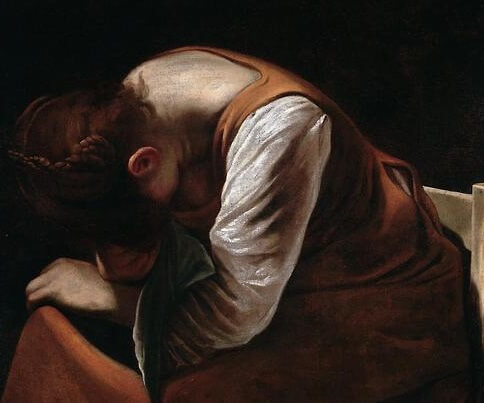Late Repentance: The After-Christmas Sins

We have all made our resolutions and soon we will have broken our resolutions. We are all guilty of thinking that attaining virtue is as simple and quick as muttering a few righteous incantations over our own souls in the privacy of our heads. But if overcoming problems with drink, drugs, violence, lies, and sex were as simple as silently muttering, “I will not get drunk anymore,” we did not need to wait until the end of the year. Certainly we had a free half-second back in April in which to suddenly become holy and good. And so January becomes even bleaker than it otherwise need be. Not only must we return to the office, we must return to the office as hopeless, recalcitrant traitors who have been freshly reminded (on just the second day of the year, perhaps the third) that we cannot make good on our vows for more than a day. The gloom of January is this: “…once again we have sent Him away, Begging though to remain His disobedient servant, The promising child who cannot keep His word for long,” as W.H. Auden summarizes in the appropriately bleak after-Christmas verses of “For The Time Being.”
In Canto IV of the Purgatorio, Dante encounters Belacqua, a man who waited until the very end of his life to repent. Belacqua must wait outside the gates of Purgatory for the same amount of time in which he was stiff necked while alive. He is one of “the late repentant,” but we must remember that the late repentant are not “the dishonest repentant.” Neither is the late repentant the insurance-policy repentant, the better-confess-before-I-die-just-in-case repentant. The late repentant is one who enjoys the ersatz pleasures of vice for a very long time, promising himself he will confess and be good as he nears death, and then, upon nearing death, realizes waiting to repent is profoundly foolish. It is not “forestalling repentance” which is wrong, but“forestalling repentance.” Repentance is only repentance if there is genuine remorse that repentance has not come sooner. When repentance finally comes for the late repentant, he is not sorry the time has come to give up sin, but sorry he did not give it up long ago.
Any man who makes New Year’s resolutions is the late repentant. There is no need to wait until December 31st to resolve to be virtuous. Goodness is timeless. If the resolution will last, it must be built on something other than the calendar date, although we should note that God truly takes the late repentant. However, Belacqua must wait outside the gates of Purgatory for the same number of years he waited to repent. If he refused to repent for thirty years, he must wait outside the gate of Purgatory for thirty years, as well.
At first glance, the discipline does not seem to correct the crime. If the turn Belacqua made late in life were real, why not allow him immediate access to the place where he can refine his soul? Refining a soul takes patience, but must we be patient before even beginning to refine a soul, too? Anyone who has failed their New Year’s resolutions on the second day of the year knows the answer to this question is Yes.
The man who puts off repentance is not patient, but impatient for righteousness. If he can not have righteousness now, he does not want to wait for it. The late repentant refused to wait for righteousness. Righteousness arrives slowly, but it only ever arrives slowly. A man must wait for righteousness and do nothing sensually gratifying as he waits. You cannot drink to pass the time while waiting to be sober. The line for righteousness is always long, and there is nothing to do in the line but wait. There is never a more convenient time to come back to the Righteousness Bank— no better time when the line is shorter. Belacqua is marooned outside of Purgatory because patience is a virtue, and even the virtue of patience requires patience.
Any good New Year’s resolution will involve putting off vice and gaining virtue. Vice, of course, always caters to the impatient. There is no good thing God will finally withhold from the righteous, but vice offers cheap versions of those future goods here and now. Virtue is always about patience, then, and waiting for God. You have resolved, then, to become patient. Patiently wait for it.

Joshua Gibbs
Joshua Gibbs teaches online classes at GibbsClassical.com. He is the author of How To Be Unlucky, Something They Will Not Forget, and Blasphemers. His wife is generous and his children are funny.










